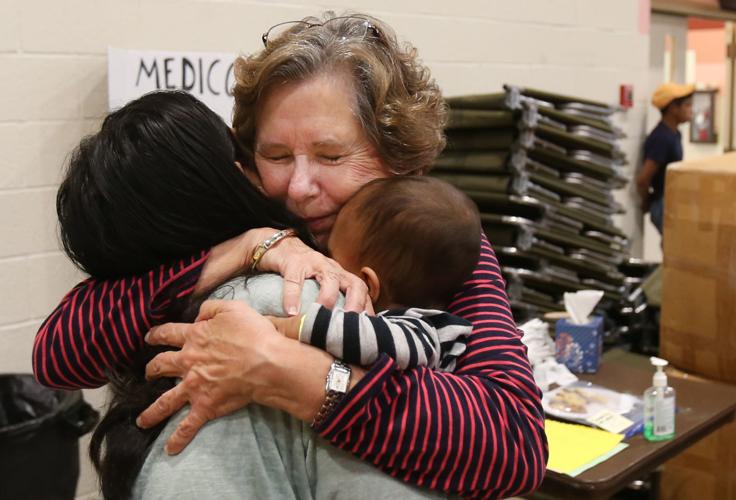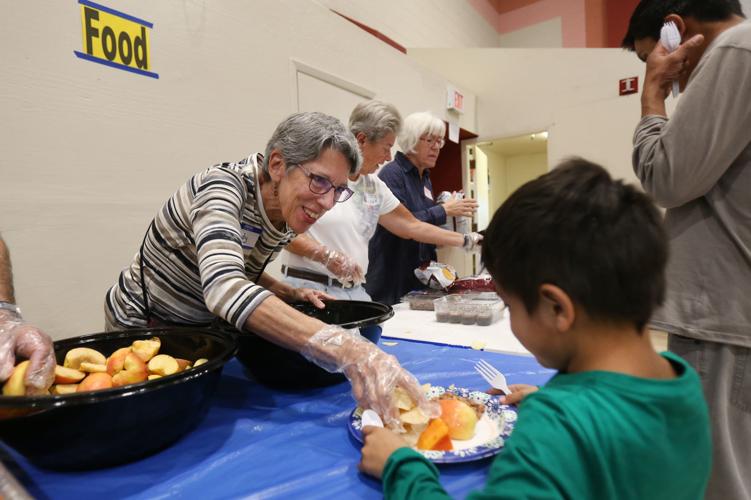You can’t spend much time at the old Benedictine Monastery on North Country Club Road without being struck by the miracle of the place.
By sheer force of effort and goodwill, hundreds of volunteers and donors have turned it into a humming, full-service migrant-processing center, adaptable to the waves of mostly Central American asylum seekers dropped off by federal immigration agencies.
The specific node of the volunteer machine that impressed me when I visited Friday was the transportation center.
There, out-of-town volunteer Perry Wallack and Tucsonan Patrick Earvolino have helped systematize the bus rides that dozens of migrants are scheduled to take daily from Tucson. A color-coded spreadsheet of the migrants, their out-of-town sponsors, their destinations and their bus departures is displayed on a big screen as volunteers work through a Greyhound call center to plan departures.
But the activity also raises questions for Tucsonans. One is simply whether we can keep this up, an effort that, for example, on Thursday, required 153 volunteers and a constant stream of material donations — shoes, backpacks, food.
This may be especially challenging after July, when the developer of the monastery property closes the migrant shelter, operated by Catholic Social Services’ Casa Alitas, to begin building apartments on the site. Organizers are looking for a replacement site.
The other question is whether this mobilization is taking away from our existing charitable efforts — for example, volunteering at and donating to Tucson’s longstanding homeless shelters and service centers for the needy.
To put a sharper point on the question: Is our effort to give shelter to Central American refugees dumped on us by Border Patrol hurting our efforts to take care of needy Americans?
I checked with five charities that operate homeless shelters or offer services to the homeless, along with two migrant shelters and many volunteers to try to answer these questions.
Most people say there has been no conflict between the demand for volunteers and donations at the migrant shelters and the demand for the same at the existing charities.
“It’s a false narrative that if you help people who are seeking asylum, then you won’t be able to help someone else,” Tom Litwicki of Old Pueblo Community Services told me.
His group has occasionally provided short-term housing for asylum seekers over the past couple of months, though their primary mission is to help local residents who have been homeless, incarcerated or otherwise down on their luck.
Foreign asylum-seekers aren’t their usual clientele, Litwicki said, but “we help people who are homeless. If Border Patrol drops you off at the bus station with nowhere to go, you’re homeless.”
Salvation Army donations decline
Of the five agencies I contacted — Old Pueblo, Primavera Foundation, Gospel Rescue Mission, Sister Jose shelter and Salvation Army — only one reported a notable drop in volunteerism or donations this year.
The Salvation Army, which depends heavily on donations at Christmastime, has had a decline of about 9 percent in the Tucson area since its fiscal year began Sept. 1.
Geoff Gephart, who helps run fundraising for the group, said they do not attribute the decline to the competing demand of the migrant shelters. He said the drop was evident around the holidays, which coincided with the partial federal government shutdown and preceded the current migrant wave.
Representatives of all the agencies said volunteerism has been steady, not declining. But there is an increasing need also in the local legacy organizations.
The Gospel Rescue Mission opened its Center of Opportunity, a shelter and service center in a former hotel, at 4550 S. Palo Verde Road, over the last couple of weeks. That quadrupled the group’s shelter capacity, director Lisa Chastain said.
“Because we’ve increased the capacity, we’ve needed to increase the volunteer capacity tremendously, too,” she said.
I sat down Friday after lunch with a trio of women who for years have made and served lunch at Gospel Rescue Mission weekly — Toni Hoskins, Anne McIntyre and Susie Blatchford.
The volunteers now give the clients table service rather than serving the food cafeteria style, which is part of what the agency terms its new “radical hospitality.” They served about 190 people on Friday and slipped a plate in front of me as we talked.
Hoskins told me she does it for the hugs from clients — “We all need validation of some kind.”
Adding volunteer hours
This trio has not been volunteering at the migrant shelters, but there are some in Tucson who have simply added migrant shifts or donations to their existing gigs at homeless shelters or other charities.
Katie Hirschboeck is one of at least seven people who have long volunteered at the Sister Jose women’s shelter who now volunteer at the migrant shelters as well.
She explained that she started volunteering 3-4 hours per week at Sister Jose in December 2017 and then joined the monastery crew in February this year. Now she is the linen and laundry coordinator there, working 3-4 hours per week, plus occasional drop-ins.
“I do the same amount of work I’ve been doing at Sr Jose’s and added the monastery work on top of that,” the retiree explained via email. “I’m very committed to both shelters and see my efforts as a continuum of reaching out, helping, and loving my neighbor in need, most of whom have suffered trauma, violence, and loss of dignity and who need to feel they are valued as fellow human beings.”
A similar spirit moves Jeanne Holt, whom I met Friday at the migrant shelter as she pushed donations around on a long cart.
She’s a member of Palo Verde Church of Christ, on the east side, where members still make lunches for the Casa Maria soup kitchen once a month as well as a monthly meal at the Ronald McDonald House. She, too, is simply adding to her volunteer efforts.
Normally, these local charities lose many volunteers when students and snowbirds leave in April and May. But at the monastery and connected migrant shelters, others have been making up for them.
Wallack, the young man who helped set up the transportation system, is one of a half-dozen out-of-town student interns who are working at the monastery. He’s from Boston and goes to Duke University.
Then there are other out-of-state visitors who show up for long stretches to volunteer. One of them, Tracy Ivchenko, has come from Wisconsin for two weeks. A professional in human services, she’s been staying overnight with a pregnant Central American woman who has shown signs of mental illness.
This weekend, Ivchenko is scheduled to fly to Newark, N.J., with the woman and her daughter to meet the woman’s husband, who is in New York state. Then Ivchenko will return to Tucson for her second week at the monastery.
If motivation wanes
For many volunteers at the migrant shelters, the presence of children and families is what is especially motivating. But as time goes on, if this wave doesn’t subside, even they may exercise less of a tug on people’s consciences.
I asked Stuart Mellan, CEO of the Jewish Federation of Arizona, about its recent contributions to Casa Alitas, the migrant shelter. The group raised $75,000 for the effort, which the shelter program can draw on for specific needs.
But Mellan is concerned about how things will go if the crisis continues, going from acute to chronic.
“Sustainability is always a worry,” he said. “It’s in the news; people are compassionate. Is the interest level going to stay?”
It would be natural for interest to wane over time. But here’s what I find encouraging: Tucson seems to have reacted to this new social crisis by tightening up on the slack in our lives. People who already were giving are giving more. People who already volunteered are volunteering more. And people who were doing neither have discovered the fulfillment of doing it.
Tucson was already a giving town that thought of ourselves as pretty poor and stretched. But maybe now, we can see our resources weren’t as limited as we thought.
The miracle at the monastery has shown it.






